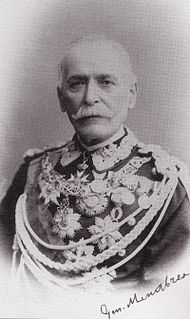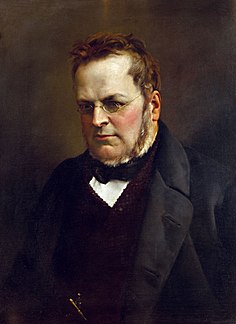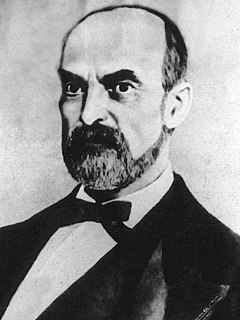
Luigi Federico Menabrea, later made 1st Count Menabrea and 1st Marquess of Valdora, was an Italian general, statesman and mathematician who served as the Prime Minister of Italy from 1867 to 1869.

Agostino Depretis was an Italian statesman and politician. He was the Prime Minister of Italy for several times between 1876 and 1887 and leader of the Historical Left parliamentary group for more than a decade. He is the fourth-longest serving Prime Minister in Italian history, after Benito Mussolini, Giovanni Giolitti and Silvio Berlusconi. Depretis is widely considered one of the most powerful and important politicians in Italian history.

General elections were held in the Netherlands on 28 April 1971. The Labour Party (PvdA) emerged as the largest party, winning 39 of the 150 seats in the House of Representatives. The elections were the first without compulsory voting, causing a sharp fall in voter turnout, down to 79.1% from 94.9% in the 1967 elections. Barend Biesheuvel of the Anti-Revolutionary Party (ARP) became Prime Minister, leading the first Biesheuvel cabinet.
The Democratic Party is a center-right party in Bulgaria led by Alexander Pramatarski. The party is a member of the European People's Party (EPP).

General elections were held in Sweden on 16 September 1979. Although the Swedish Social Democratic Party remained the largest party, winning 154 of the 349 seats in the Riksdag, the liberal interim government of Ola Ullsten was succeeded by another centre-right coalition government composed of the People's Party, the Moderate Party and the Centre Party, led by Centre Party leader Thorbjörn Fälldin. The three parties together won 175 seats, compared to the 174 won by the Social Democrats and Communists. It was the only time that non-socialist parties retained power in an election between 1928 and 2010. The Moderates dramatically increased their representation in the Riksdag, becoming the largest party of the non-socialist bloc, a position they have maintained ever since.

General elections were held in Sweden on 15 September 1985. The Swedish Social Democratic Party remained the largest party in the Riksdag, winning 159 of the 349 seats. Its leader, Olaf Palme, kept his position as Prime Minister. He would retain this position successfully until his assassination in 1986.

Parliamentary elections were held in Greece on 31 March 1946. The result was a victory for the United Alignment of Nationalists, an alliance that included the People's Party, the National Liberal Party, the Reform Party, which won 206 of the 354 seats in Parliament. As a result Konstantinos Tsaldaris became Prime Minister leading a right-wing coalition. Nonetheless, he soon decided to resign in favor of Themistoklis Sophoulis, who led a government of national unity during the entire second phase of the civil war (1946–1949). One of the priorities of the new government was the proclamation of a plebiscite for the restoration of the Greek monarchy.
Parliamentary elections were held in Finland on 1 and 2 July 1936. Following the election Prime Minister Toivo Mikael Kivimäki of the National Progressive Party was defeated in a confidence vote in September 1936 and resigned in October. Kyösti Kallio of the Agrarian League formed a centrist minority government after Pehr Evind Svinhufvud refused to allow the Social Democrats to join the government. After Svinhufvud's defeat in the February 1937 presidential election, Kallio took office as the new President in March 1937, and he allowed the Social Democrats, Agrarians and Progressives to form the first centre-left or "red soil" Finnish government. Aimo Cajander (Progressive) became Prime Minister, although the real strong men of the government were Finance Minister Väinö Tanner and Defence Minister Juho Niukkanen (Agrarian).

General elections were held in Italy on 27 January 1861, with a second round on 3 February. The newly elected Parliament first convened in Turin on 4 March 1861, where, thirteen days later, it declared the unification of the country as the Kingdom of Italy.

General elections were held in Italy on 22 October 1865, with a second round of voting on 29 October. It was the second one in the history of Italy.

General elections were held in Italy on 20 November 1870, with a second round of voting on 27 November. They were a snap election, called by Prime Minister Giovanni Lanza to take advantage by the Capture of Rome and to give parliamentary representation to the future capital of Italy.

The 1874 Italian general election was held in Italy on 8 November, with a second round of voting on 15 November. They were a snap election, called by Prime Minister Marco Minghetti to strengthen his majority.

The Italian general election of 1876 was held in Italy on 5 November, with a second round of voting on 12 November.

General elections were held in Italy on 16 May 1880, with a second round of voting on 23 May.

General elections were held in Italy on 29 October 1882, with a second round of voting on 5 November. The "ministerial" left-wing bloc emerged as the largest in Parliament, winning 289 of the 508 seats.

General elections were held in Italy on 23 May 1886, with a second round of voting on 30 May. The "ministerial" left-wing bloc emerged as the largest in Parliament, winning 292 of the 508 seats. As in 1882, the election was held using small multi-member constituencies with between two and five seats.

















